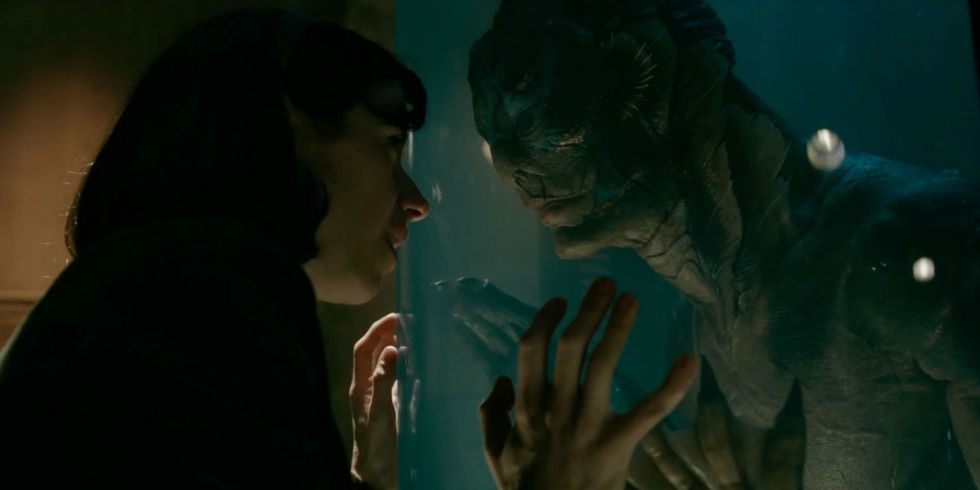Raindrops dancing on a window. The still surface of a pool. A room drowned in water and a woman floating—Sleeping Beauty rocked by the sea. The Shape of Water, Guillermo del Toro’s new film, pools in the mind and seeps into the imagination. It’s a love story as fluid as the deep.
The tale begins with Elisa Esposito (Sally Hawkins), a janitor at a government facility in the early 1960s. An orphan and mute since childhood (her throat is striped with scars), she lives alone, sticking to the same routine: alarm clock, boiled eggs, bus to work and back again. Life is grim but Elisa isn’t. Buffeted by a world that makes her feel like an outcast, she responds with an open heart, always curious, always kind. When a top-secret ‘asset’ is wheeled into the base in a tank, others stand by warily, but Elisa walks over and places her hand on the glass. The contents make her jump: floating inside is a man-sized amphibious creature (Doug Jones). Despite his initial hostility, Elisa is fascinated with the Creature and slowly befriends him, teaching him sign language, bringing him gifts of boiled eggs and smuggling in a record player to introduce him to music. To everyone else he’s a test subject or a threat; to Elisa he is a friend.
Hawkins achieves a delicate balance: Elisa is innocent, but not naïve. Her interest in the Creature is rooted as much in loneliness as it is compassion. She does have friends: her next door neighbour, Giles (Richard Jenkins), a struggling artist, and Zelda (Octavia Spencer), a cleaner at the base who often translates for her. But both of them tend to use Elisa as a vent to let off steam, inundating her with complaints and the minutiae of their daily lives. The Creature never demands anything of her or sees her as incomplete. Their relationship unfolds like a fairy tale—Beauty and the Beast crossed with The Little Mermaid—but to believe it, we must first believe in her. As Elisa, Hawkins is the film’s heart, ethereal and full of longing. A princess without a voice, she nevertheless speaks clearly, each glance and gesture filled with meaning.
Into the fairy tale walks an ogre. Strickland (Michael Shannon) is a chauvinist, racist and bigot. He is also the Creature’s jailer. A predator without conscience, he bullies his subordinates and tortures his charge. Subjugating others gives him purpose. Shannon has a back catalogue of twisted zealots (most notably Nelson Van Alden in Boardwalk Empire), but Strickland is among his most savage, a living embodiment of Cold War-era jingoism and paranoia. Even his own family are incapable of humanising him. Instead he turns his attention to Elisa, whose inability to speak makes her his ideal fantasy: a silent woman. Watch the gleam in Shannon’s eyes as Strickland spies on her from his office. In this tale the monsters are human.
With Strickland for an authority figure, it’s no wonder the film’s sympathies are with its outsiders. Giles is a closeted gay man who fears life has passed him by. He has a crush on a waiter at a local pie shop and visits over and over again, trying to decipher the young man’s feelings. Jenkins conveys Giles’ vulnerability with each tentative smile. Zelda is an African-American woman working for employers convinced she is inferior. Sassy in private (Spencer gets many of the film’s biggest laughs), she treads carefully in public, navigating her way through the minefield of white prejudice. And Dr. Hoffstetler (Michael Stuhlbarg) appreciates the Creature as a marvel, sentiments not shared by any of his superiors. Stuhlbarg has a gift for watching and listening that holds an audience’s attention every moment he’s onscreen. (He is also this award season’s most valuable player, appearing in not one but three of the films nominated for the best picture Oscar: Call Me by Your Name, The Post and this film.)
Part of the rapture of The Shape of Water is that it could only have been made by Guillermo del Toro. The visual lyricism, the combination of horror and beauty—his imagination suffuses every frame. The Creature is a being of flesh and blood and gills, as real as any human. Del Toro has the generosity of spirit to suggest that even the greatest of outcasts deserves love.

Sounds wonderful. Can’t wait to see it.
This has piqued my curiosity, I shall definitely watch ‘The Shape of Water’.